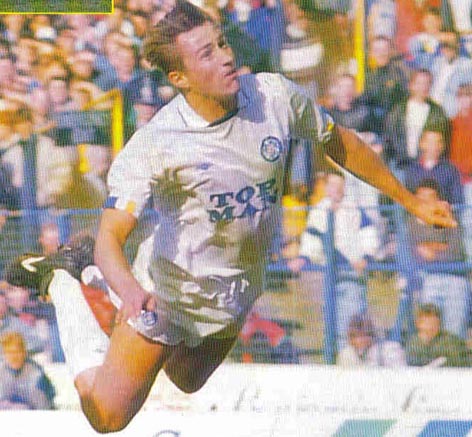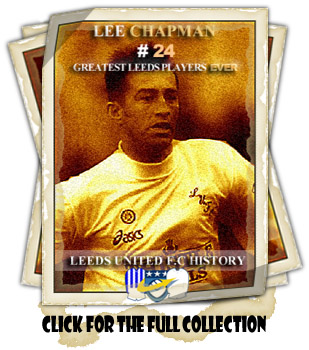

Chapman: Lee Roy (Lee)
1990-1993 & 1996-1996
(Leeds Player Details)(Player Details)
Centre Forward
Born: Lincoln: 05-12-1959
Debut v Blackburn Rovers (a): 13-01-1990
6’3” 13st (1989)
#24 in 100 Greatest LUFC Players Ever

Chapman, whose father Roy played for Aston Villa, Lincoln City twice, hence Lee’s place
of birth, Mansfield Town, Port Vale and Chester, began his professional career with Stoke
City in June 1978. He was loaned to Plymouth Argyle as a youngster in December 1978, where
he gained experience by making three starts and one game from the bench during his one
month loan spell from 5th December 1978 to 31st December 1978, but failed to open his goal
account. He was given his League debut, by Malcolm Allison, as a nineteen year-old, on 9th
December 1978 in Argyle's 1-1 home draw with Watford and played his final game for them
on 30th December 1978 as the Pilgrims went down 0-2 at Gillingham. Returning to Stoke he
broke into the first team in 1979, making ninety-five starts and four games from the bench
in League games and scoring thirty-four goals. He also scored once in three starts in the
F.A. Cup and three in five starts in the League Cup. He had showed enough early promise to
win an England Under-Twenty-One cap at Anfield in a 1-0 win over Ireland on 25th February
1981, when he was replaced at half-time by Justin Fashanu. However, after establishing
himself at Stoke his career faltered with two big money moves to Arsenal for £500,000 in
August 1982 and Sunderland for £100,000 in December 1983. He had come to the attention of
Arsenal for his obvious promise and raw talent. After moving to Highbury he played
twenty-three times, of which eight were as a substitute, and scored just four goals in
League games in his sixteen month stay with the Gunners. He had also scored twice in Cup
and other matches from two starts and three games from the bench, before moving to
Sunderland. He had similar problems establishing himself at Roker Park, scoring just
three goals in playing fifteen League games, including one as a substitute, and scoring
once in two F.A. Cup ties in the latter part of the 1983-84 season. He had to be thankful
to Howard Wilkinson, who got the best out of Chapman when he signed him for Sheffield
Wednesday on 24th August 1984. He rediscovered his goalscoring prowess, netting
sixty-three times in one hundred and forty-seven starts and two games from the bench in
the League. He got ten more in eighteen F.A. Cup ties, including one from the bench, another
six in seventeen starts in the League Cup, but failed to add to his tally in two starts and
a game as a substitute in other games. He stayed with the Owls for four years but after
Howard Wilkinson had left, he too departed Hillsbrough for pastures new in France, where
he tried his luck with Chamois Nortais, who paid £350,000 for his services on 1st June
1988. The move was a disater as the troubled French side threatened to succumb to their
financial problems. Brian Clough's Nottingham Forest paid £300,000 to bring him back to
England on 17th October 1988, after Chapman had scored three times in ten games for the
Niort based French club. He stayed at the City Ground for fifteen months and experienced
the high of being part of the Forest team that won the League Cup and the Zenith Data
Systems Cup in 1989, scoring twice at the old Wembley in the final of the latter, but also
the experiencing the dreadful low of being a Forest player on the day of the Hillsborough
Disaster. He scored fifteen goals in forty-eight League games, three goals in five F.A. Cup
starts, six goals in twelve League Cup starts and three goals in six starts in the Zenith
Data Systems Cup games. Chapman, who is married to actress Lesley Ash, once scored a
hat-trick for Stoke City at Elland Road in 1980-81, but he did not think of that as he
didn't need to be asked twice to rejoin his former mentor and £400,000 was the price Leeds
United paid to bring Chapman back to the scene of his former triumph and to link up again
with Howard Wilkinson on 11th January 1990. He was an immediate success, helping United win
the Second Division title in 1990. A powerful man in the air, he joined the large
ex-Sheffield Wednesday contingent at Elland Road. He scored the goal at Bournemouth which
sealed the Second Division Championship for Leeds in May 1990. Mel Sterland was one former
colleague who kept an endless supply of crosses heading in his direction, and with two
goals against his former club Nottingham Forest in the final game of 1990-91 he took his
tally for the season to thirty-one, the best by any striker in the First Division and
pushed his career tally to two hundred. He was an integral part of the Leeds team that won
the last ever First Division title, prior to the formation of the Premier League. During
his spell at Leeds, his form was rewarded with a single England "B" on 27th October 1991
at Vicarage Road, Watford, in a 1-0 win over Iceland, when the England goal was scored by
Nigel Clough, his replacement at Forest, and he was replaced in the sixty-ninth minute by
Brian Deane, who would be the player to replace him at Leeds as Wilkinson began rebuilding
his team. A transfer to Portsmouth followed on 11th August 1993, for £250,000, where he
started five League matches, scoring twice and failing to score in one other game. Just
four months later he was back in the top flight with West Ham United for a similar fee,
on 16th September 1993, going on to score seven times in thirty-three League starts and
seven games from the bench. He also scored twice in six F.A. Cup appearances and twice in
four starts and one game from the bench in the League Cup. Now past his prime, he was
loaned out to Southend United, scoring on his sole appearance. He was hastily recalled by
West Ham to be sold for a cut-price £70,000 to Ipswich Town on 19th January 1996. He
failed to capture the fan’s hearts at Portman Road, but rejoined Leeds on loan on 11th
January 1996, as Wilkinson found his attack badly affected by injuries, suspensions and
international calls. He lined up against his old club West Ham United and played a big
part in the opening goal of a 2-0 win, but minutes later he was sent off. The following
week he played in the 5-0 thrashing at Liverpool, was substituted and, after serving his
suspension, returned to Ipswich. At Portman Road he scored one single League goal in
eleven starts and eleven games from the bench in League games and he also started one
League Cup game and two other games without scoring. On 28th Match 1996 he moved to his
last Football League club, Swansea City, where he scored four times in seven League
starts before winding down his career with a five game spell with Strømsgodset in Norway,
to finish with an impressive career total of one hundred and ninety-seven goals from five
hundred and fifty-two Football League appearances. He pursued a successful career in
broadcasting and sports writing and, with his wife, owned a series of bars and
restaurants, the last of which was the Teatro winebar in Soho.